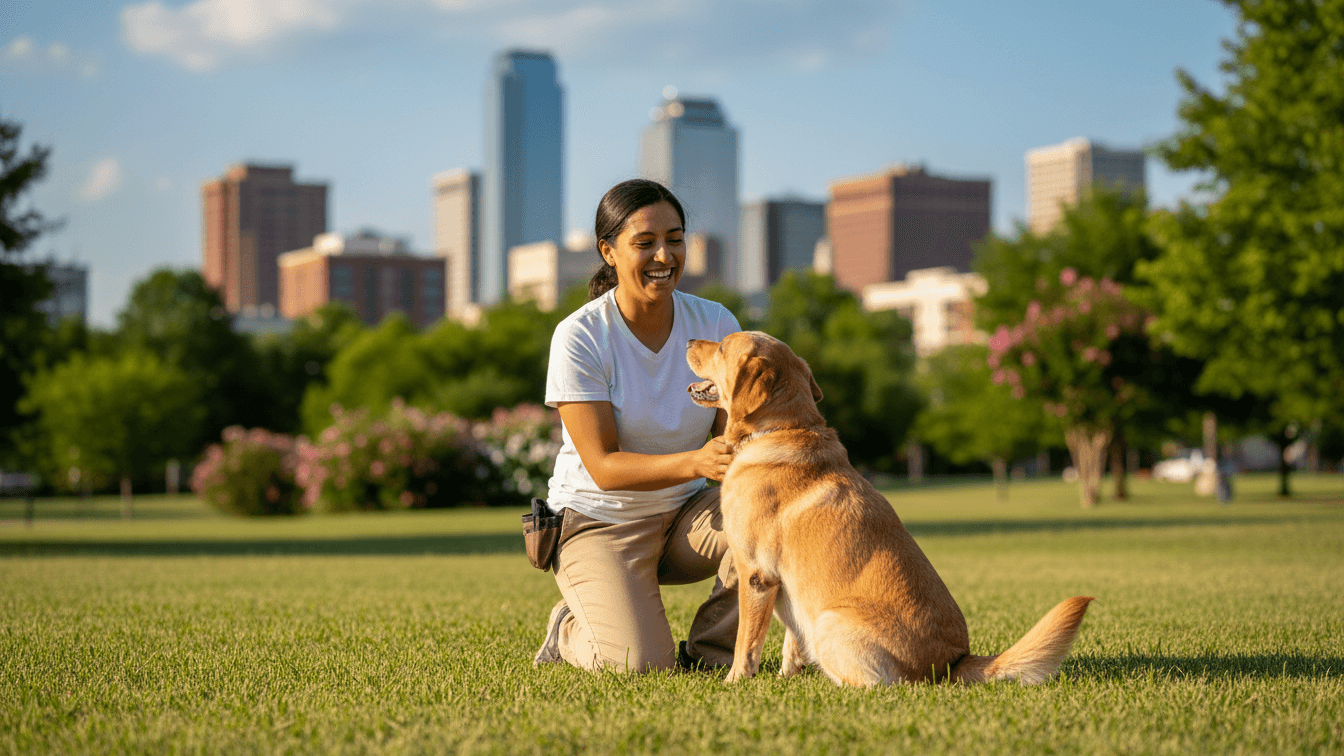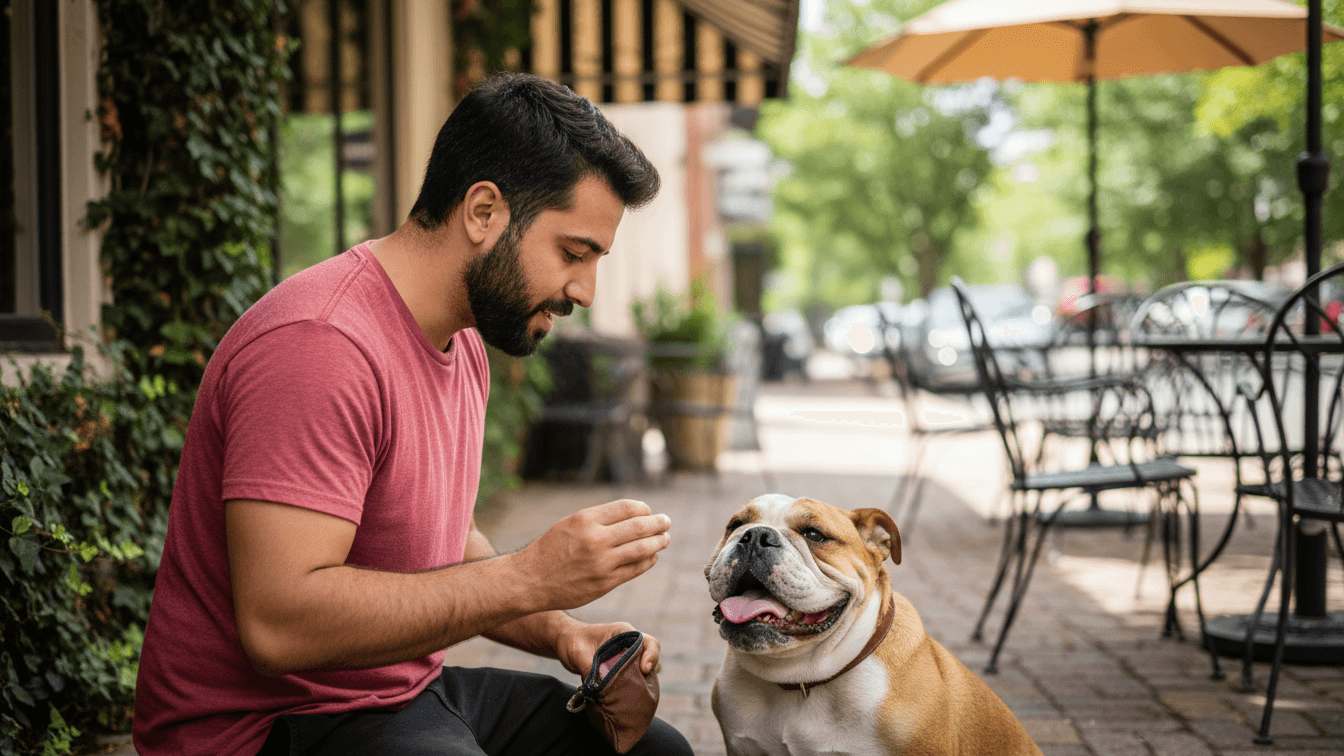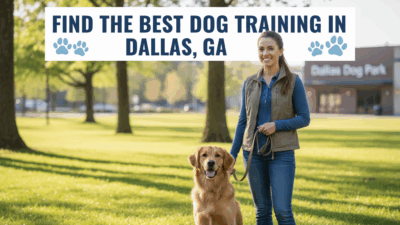Your Complete Guide to Choosing a Dog Trainer in Dallas, GA and Surrounding Areas
Living with a dog in Dallas means navigating downtown’s historic square, strolling through Silver Comet Trail access points, and managing your dog’s manners at local shops along Main Street. Your dog needs to handle everything from busy festival days to quiet neighborhood walks without pulling or jumping on strangers.
Dallas serves as the county seat of Paulding County, so most regulations follow county and city guidelines. When you find a trainer who understands these local details, you’ll get better results both at home and around town.
How to Choose the Right Trainer
Start by looking for someone who uses positive reinforcement training and can set realistic goals for your Dallas lifestyle. This means your dog should learn to walk calmly through downtown, stay focused near busy school pickup zones, and handle visits to local businesses without drama.
Credentials give you a quick way to compare trainers’ experience levels. Common dog trainer certifications include KPA-CTP, CPDT-KA, or IAABC-CDBC for behavior problems. If your dog has serious aggression issues, look for someone with CBCC-KA or a science-based program like CTC.
In-home dog training works great for puppy training, door greetings, and neighborhood leash skills. Group classes make sense once your dog can focus around other dogs, especially before you try busy spots like the Dallas Farmers Market or community events on the square.
Common Dog Training Methods Explained

Reward-based methods build the trust you want while creating lasting behavior changes. They also help you follow Dallas and Paulding County rules about keeping dogs under control in public.
Basic obedience covers sit, down, stay, place, recall, and leash training so your dog can handle walks, outdoor patios, and park visits without pulling or jumping on people. These core skills make life easier whether you’re at the courthouse lawn or exploring residential areas.
Puppy classes focus on socialization, potty training, bite control, crate comfort, and early leash skills. Starting with short, positive training sessions prevents bad habits from forming in the first place.
Behavior modification addresses fear, reactivity, resource guarding, or separation anxiety through careful desensitization and counterconditioning. For serious cases, ask if your trainer works with local veterinarians who understand behavior medicine.
Private lessons let you customize everything around your daily routines, while dog training services like day training can speed up results when you’re short on time. Day training means a professional dog trainer works with your dog during the day, then teaches you how to maintain the progress.
Dog training classes help your dog practice good manners around other dogs and people. The best group classes give dogs plenty of space, screen participants carefully, and teach calm behavior rather than just excitement.
Specialized training like therapy dog training or service dog training requires extra structure, public-access skills, and a very clear step-by-step training program. These dogs need to remain calm and focused in all public settings.
Stay away from trainers who use fear, intimidation, or pain to get results. Humane methods are safer for everyone, easier to maintain long-term, and much better for keeping peace with your neighbors.
Average Cost of Dog Training in Dallas, GA and Surrounding Areas (Updated for 2025)
Prices around Dallas and Paulding County depend on the trainer’s experience, how long training sessions last, and where the training happens. Here’s what most local pet owners are paying in 2025.
| Service Type | Average Cost (Dallas/Paulding County) |
|---|---|
| Puppy classes (4-6 weeks) | $140-$260 total |
| Group obedience training (4-6 weeks) | $150-$280 total |
| Private lessons (60-90 min) | $100-$175 per session |
| In-home coaching packages (4-6 visits) | $400-$850 total |
| Day training (trainer works your dog + handoff) | $425-$900 per week |
| Behavior consult for reactivity/anxiety (initial) | $140-$225 |
| Board and train (2-4 weeks) | $1,900-$4,200 total |
You’ll probably pay extra travel fees for longer distances within Paulding County or neighboring areas. Expect higher rates for complex behavior work involving aggression or severe anxiety.
Make sure you understand what’s included in each training program, how the trainer tracks progress, and whether they offer a free consultation or free evaluation before you sign up.
Questions to Ask a Potential Dog Trainer
- What training methods do you use, and how do you keep sessions positive and low-stress?
- What credentials do you have, like KPA-CTP or CPDT-KA? Do you keep up with continuing education such as CPDT-KSA?
- How will you customize the training plan for my dog’s specific needs and our Dallas lifestyle?
- Do you offer in-home visits, dog obedience training classes, or day training, and which approach fits my goals best?
- How will we measure my dog’s progress and know when to add more distractions?
- What are the total costs, including any travel fees, and what’s your cancellation policy?
- Do you carry liability insurance, and can you show me proof?
- For behavior problems, will you work with my veterinarian if needed?
- What should I practice between our sessions to help my dog keep improving?
Local Dallas and Paulding County Rules and Considerations
Dallas enforces leash laws and nuisance rules to keep parks and neighborhoods safe for everyone. Paulding County follows Georgia state public health requirements too.
Leashes are required in all public spaces except inside designated dog parks. Keep a standard 6-foot leash with you for downtown walks, school zones, and community events.
Georgia law requires current rabies vaccination for all dogs. You can get these through county clinics or your regular vet. Paulding County Animal Control manages rabies records and offers low-cost vaccination clinics periodically.
Excessive barking can be considered a nuisance under local ordinances, so work with your trainer on alert barking and separation anxiety before neighbors start complaining. Good training for dogs helps prevent these issues.
Georgia doesn’t require special licenses for dog trainers, but certified dog trainers often carry liability insurance to protect themselves and their clients. If a trainer offers board and train services with overnight stays, they should follow standard business regulations and maintain proper insurance coverage.
Paulding County Animal Control handles animal complaints, licensing information, and lost pet reports. They can answer questions about local requirements and provide resources for responsible pet ownership.
Local Dallas Resources for Dog Owners
These spots give you great places to practice polite manners, work on recalls, and provide safe enrichment for your dog. Always follow the posted rules and etiquette guidelines.
- Nathan Dean Park Dog Park offers a fenced area for off-leash play with separate spaces for large and small dogs. Practice recalls and calm greetings during quieter times of day.
- Silver Comet Trail provides miles of paved paths perfect for leash training and building focus around walkers, cyclists, and other dogs. Keep your dog on a leash at all times on the trail.
- Sara Babb Park welcomes leashed dogs and offers open spaces for practicing distance commands and socialization around families and children.

FAQs
How much does in-home dog training cost?
Most Dallas area trainers charge $100-$175 per in-home visit, with discounts available when you buy packages. Behavior problems like reactivity or aggression typically start at the higher end of that range.
Is in-home dog training worth it?
Absolutely, because you’re working on problems exactly where they happen. Your trainer can fix door manners, jumping on guests, counter-surfing, and yard reactivity right at home, then step outside to practice leash skills on your actual neighborhood sidewalks and help your dog become a well-behaved dog in real-world settings.
Can you pay someone to house train your dog?
Yes, many trainers offer puppy programs that include potty training, crate routines, and daily schedules. Day training can speed up the process while teaching you how to maintain the progress.
What is the 3-3-3 rule for dog training?
This is a helpful timeline for new or adopted dogs: expect about 3 days for your dog to decompress, 3 weeks to learn your routines, and 3 months to feel completely settled. Good training programs work with this natural adjustment period rather than rushing results.
How long will it take to reach my training goals?
Most puppies and friendly adult dogs show solid progress within 4-8 weeks if you practice daily. Fear, reactivity, or aggression typically requires several months of careful behavior modification with gradual increases in difficulty. Expert dog trainers will give you a realistic timeline based on your specific situation.
What should I bring to group classes?
Pack a flat collar or harness, a 6-foot leash, high-value treats, water, and current vaccination records if your trainer requests them. Leave retractable leashes at home for safety reasons.
What’s the leash law in Dallas?
Dogs must be leashed and under control in all public areas, except inside designated off-leash dog parks. Keep that 6-foot leash handy for downtown walks, parks, and the Silver Comet Trail.
Do I need a dog license in Dallas or Paulding County?
Paulding County doesn’t require general pet licenses, but keep your dog’s rabies vaccination current and maintain a record of it. Contact Paulding County Animal Control for specific requirements and any updates to local regulations.
What shots does my dog need in Paulding County or Georgia?
Rabies vaccination is required throughout Georgia. Your veterinarian may also recommend distemper-parvo, bordetella, and leptospirosis based on your dog’s lifestyle and exposure risks. Georgia Department of Agriculture oversees animal health regulations statewide.
Are dog trainers required to be licensed in Dallas or Paulding County or Georgia?
No special trainer licenses exist in Georgia. Trainers follow normal business regulations, but reputable professionals carry liability insurance and pursue voluntary certifications to demonstrate their knowledge and commitment to humane methods.
Where can I practice off-leash recall?
Use fenced dog parks like Nathan Dean Park Dog Park to keep things safe and legal. Try visiting during quieter hours when you’re starting out. Never practice off-leash recalls in unfenced public areas where leash laws apply.
Which dog parks allow training around Dallas?
Nathan Dean Park Dog Park allows off-leash play and training practice within its fenced areas. Always follow posted rules, pick up after your dog, and supervise interactions with other dogs closely.
What trails allow dogs for training?
The Silver Comet Trail welcomes leashed dogs and offers excellent opportunities for distance work, focus training around distractions, and building your dog’s confidence. Sara Babb Park also provides leashed walking areas. Always keep your dog on leash and clean up after them.
What if my dog shows aggression toward other dogs or people?
Work with a professional dog trainer who specializes in behavior modification and has experience with aggressive dog training cases. Look for someone with advanced credentials who uses positive reinforcement methods. They may recommend working with a veterinary behaviorist for complex cases.
Can a trainer help with separation anxiety?
Yes, a qualified trainer can help address separation anxiety through gradual desensitization exercises and environmental management. This work takes time and consistency, but the right approach can make a huge difference for both you and your dog.
The right combination of thoughtful planning, humane methods, and consistent practice around Dallas’s parks and neighborhoods will help your dog become a confident, well-behaved companion. Whether you’re preparing for downtown festivals, trail walks, or simply better home manners, professional dog training services make the journey easier and more effective.
